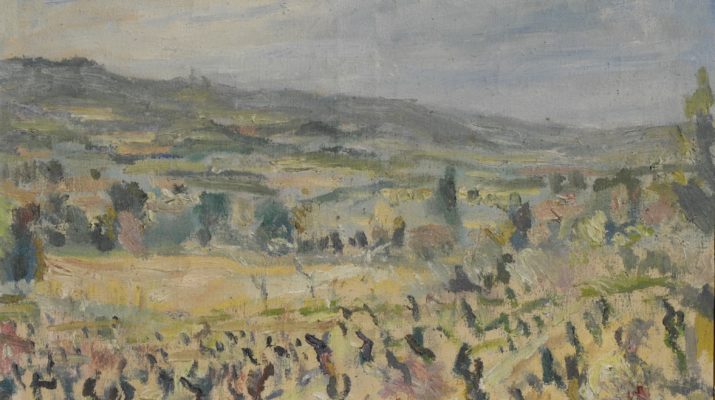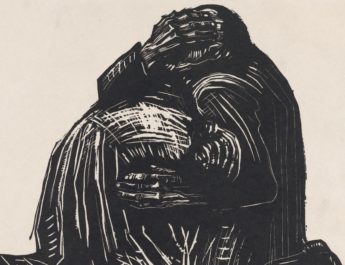Isaiah 5:1-7 & 11:1-5
NL 211
5:1 I will singI, II for my belovedIII
my loveIV songV concerning his vineyard:VI
I “sing” = shir. From shir (song, singer). This is to sing. It could also refer to one who is singing or leading others in song.
II {untranslated} = na. This particle is used for requests or for urging. It can be we pray, now, I ask you, oh. This is the same “na” in “hosanna.”
III “beloved” = yadid. 9x in OT. Perhaps from the same as dod (beloved, love, uncle, love token; root may mean to boil). This is lovely, amiable, beloved.
IV “love” = dod. Related to “beloved” in v5:1. See note III above.
V “song” = shir. Related to “sing” in v5:1. See note I above.
VI “vineyard” = kerem. This is a vineyard, garden, vines, or a vintage.
My beloved hadVII a vineyard
on a very fertileVIII hill.IX
2 He dugX it and cleared it of stonesXI
and plantedXII it with choice vines;XIII
VII “had” = hayah. This is to be or become, to happen.
VIII “very fertile” = ben + shemen. Literally, “a son of fatness.” Ben is from banah (to build or obtain children). This is son, age, child. It is son in a literal or figurative sense. Shemen is from shamen (to shine, which implies being oily, growing fat). This is fat, oil, grease, olive oil – often with perfume. Used figuratively for fertile, lavish, rich.
IX “hill” = qeren. This is horn or hill. It can be a flask or cornet, ivory, altar corner, mountain peak, or figuratively power.
X “dug” = azaq. 1x in OT. This is to dig around or built a fence around.
XI “cleared…of stones” = saqal. Properly, this means being weighty. However, it is used for stoning someone (to death) or for removing stones.
XII “planted” = nata. To fix or fasten, establish or plant. This is planting in a literal or figurative sense.
XIII “choice vines” = soreq. 3x in OT. From sharaq (to be shrill, hiss, whistle). This is best species of vine – one that gives rich, purple grapes. It can also refer to noble wine.
he builtXIV a watchtowerXV in the midstXVI of it
andXVII hewed outXVIII a wine vatXIX in it;
XIV “built” = banah. Related to “very fertile” in v5:1. See note VIII above.
XV “watchtower” = migdal. From gadal (to grow, grow up, be great, magnify, exalt). This is a tower, podium, bed of flowers. This is perhaps the root of “Magdalene.”
XVI “midst” = tavek. This is among, middle, in the midst, the center. Perhaps, properly, to sever.
XVII {untranslated} = gam. This is also, moreover, again.
XVIII “hewed out” = chatsab. This is to hew or cut material like wood or stone. It can also be to dig, quarry, split, or engrave.
XIX “wine vat” = yeqeb. 16x in OT. This is wine vat or wine press. Root may mean to excavate – so it would be the trough as excavated. Specifically, it could refer to a vat that collects wine or an upper vat where grapes are crushed.
he expectedXX it to yieldXXI grapes,XXII
but it yielded rotten grapes.XXIII
XX “expected” = qavah. It can mean to bind or gather together, especially in the sense of twisting together. In that light, it can mean collect. Figuratively, this can mean to wait, await, expect, or tarry.
XXI “yield” = asah. This is to make, do, act, appoint, become in many senses.
XXII “grapes” = enab. 19x in OT. Root may mean to bear fruit. This is a grape, raisin, or wine. It can be used for the literal crop or as a metaphor for God’s relationship with Israel.
XXIII “rotten grapes” = beushim. 2x in OT. From beosh (stink); from baash (to have a stink, act foul or loathsome – morally offensive) or bor (a pit – generally a cistern or dungeon; a well); from baar (to inscribe, dig, engrave, explain). This is wild grapes or worthless things.
3 And now, inhabitantsXXIV of JerusalemXXV
and peopleXXVI of Judah,XXVII
XXIV “inhabitants” = yashab. This is to sit and so to remain and so to dwell. It is sitting for any reason – as a judge, in order to ambush, or just sitting quietly. Causatively, this can mean settling or marrying. This can also mean continue, endure, or establish.
XXV “Jerusalem” = Yerushalaim. From yarah (to throw, shoot, be stunned; to flow as water so figuratively to instruct or teach) + shalam (to make amends, to be complete or sound). This is Jerusalem, dwelling of peace.
XXVI “people” = ish. Perhaps from enosh (human, humankind, mortal); from anash (to be weak, sick, or frail). This is man, husband, another, or humankind.
XXVII “Judah” = Yehudah. Probably from yadah (to throw one’s hands into the air in a gesture of praise); from yad (hand). This is Judah, meaning “praised.”
judgeXXVIII, XXIX betweenXXX me
andXXXI my vineyard.
XXVIII “judge” = shaphat. This is to judge, defend, pronounce judgment, condemn, or govern. It can refer to God judging or to human judges. This is pronouncing a verdict in favor or against so it implies consequences or punishment. It can also mean to litigate or govern as one with authority.
XXIX {untranslated} = na. Same as {untranslated} in v5:1. See note II above.
XXX “between” = bayin. From bin (to discern, consider, attend to; distinguishing things in one’s mind or, more generally, to understand). This is among, between, interval.
XXXI {untranslated} = bayin. Same as “between” in v5:3. See note XXX above.
4 WhatXXXII moreXXXIII was there to doXXXIV for my vineyard
that I have not done in it?
WhenXXXV I expected it to yield grapes,
why did it yield rotten grapes?
5 And now I will tellXXXVI, XXXVII you
what I will do to my vineyard.
XXXII “what” = mah. This is what, how long, purpose, whatever, how!
XXXIII “more” = od. From ud (to admonish, repeat, duplicate, testify, restore, record, relieve). This is still, yet, again, more.
XXXIV “do” = asah. Same as “yield” in v5:2. See note XXI above.
XXXV “when” = maddua. Related to “what” in v5:4. From mah (see note XXXII above) + yada (to know, be aware, see and so understand – includes observation, care, recognition; can also be used as a euphemism). This is why or how.
XXXVI “tell” = yada. Related to “when” in v5:4. See note XXXV above.
XXXVII {untranslated} = na. Same as {untranslated} in v5:1. See note II above.
I will removeXXXVIII its hedge,XXXIX
and it shall beXL devoured;XLI
I will break downXLII its wall,XLIII
and it shall be trampled down.XLIV
XXXVIII “remove” = sur. This is to turn aside in a literal or figurative sense – to depart, decline, rebel, remove, or withdraw.
XXXIX “hedge” = mesukah. 2x in OT. From suk (to make a hedge, entwine; to enclose in order to hold back or protect). This is a hedge.
XL “be” = hayah. Same as “had” in v5:1. See note VII above.
XLI “devoured” = ba’ar. This is to burn, consume, heat, remove. It can also be to consume by a fire or through eating, being brutish or wasting.
XLII “break down” = parats. This is to make a breach, burst out, compel, disperse. It is to break out literally or figuratively.
XLIII “wall” = gader. 11x in OT. From gadar (to build a wall or wall off, mason, repair, hedge, enclose; to wall in or wall around). This is any kind of enclosure – wall, fence, or hedge.
XLIV “trampled down” = mirmas. 7x in OT. From ramas (to trample or tread down; to work as a potter, to walk, or to be abusive). This is trampling a place that is trampled, abasement.
6 I will makeXLV it a wasteland;XLVI
it shall not be prunedXLVII or hoed,XLVIII
XLV “make” = shith. This is to place, set, bring, appoint, consider, bring, array or look.
XLVI “wasteland” = bathah. 1x in OT. From the same as bath (bath as a unit of measurement for liquid); probably from battah (precipice, desolation, steep). Root may mean to break to pieces. This is end, desolation, destruction.
XLVII “pruned” = zamar. 3x in OT. This is to trim or prune – to tend to a vine.
XLVIII “hoed” = adar. 10x in OT. This is to dig, help, keep rank. Properly, it is to muster troops as for battle. So, it could be to miss or lack since you can see who is missing following muster. Also, to arrange like a vineyard and so to hoe.
and it shall be overgrownXLIX with briersL and thorns;LI
I will also commandLII the cloudsLIII
that they rainLIV no rainLV upon it.
XLIX “be overgrown” = alah. This is to go up, approach, ascend, be high, be a priority; to arise in a literal or figurative sense.
L “briers” = shamir. 11x in OT. Perhaps related to shamar (to keep, watch, or preserve; to guard something or to protect it as a thorny hedge protects something). This is a thorn, brier, hard stone, diamond.
LI “thorns” = shayith. Related to “make” in v5:6. 7x in OT. Perhaps from shith (see note XLV above). This is a thorn-bush or thorn. It is some kind of wild growth.
LII “command” = tsavah. This is to charge, command, order, appoint, or enjoin. This is the root that the Hebrew word for “commandment” comes from (mitsvah).
LIII “clouds” = ab. Perhaps from uwb (to be a think or dark cloud, a cloud covering). This is a dark or thick cloud that can envelope in darkness. It can also refer to a copse or to clay.
LIV “rain” = matar. From matar (rain, a downpour). This is to rain.
LV “rain” = matar. Related to “rain” in v5:6. See note LIV above.
7 For the vineyard of the LordLVI of hostsLVII
is the houseLVIII of Israel,LIX
LVI “Lord” = YHVH. Related to “had” in v5:1. From havah (to be, become) or hayah (see note VII above). This is the name of the God of Israel, the self-existent and eternal one, the tetragrammaton. This pronunciation has been lost to time so “Lord” is generally used in its place.
LVII “hosts” = tsaba. From tsaba (to wage war, serve, assemble, fight, perform, muster, wait on). This is a large group of persons (used figuratively for a group of things). It implies a campaign literally as with army, war, warfare, battle, company, soldiers. Can also be used figuratively for hardship or for worship.
LVIII “house” = bayit. Related to “very fertile” in v5:1 & “built” in v5:2. Probably from banah (see note VIII above). This is house, court, family, palace, temple.
LIX “Israel” = Yisrael. From sarah (to persist, exert oneself, contend, persevere, wrestle, prevail) + El (God or god). This is Israel, meaning God strives or one who strives with God; new name for Jacob and for his offspring. This refers to the people and to the land.
and the people of Judah
are his cherishedLX garden;LXI
he expected justiceLXII
LX “cherished” = shaashuim. 9x in OT. From shaa (to delight, play) OR form sha’a’ (to stare, cry out, amuse self, be blinded, play). This is a delight, pleasure, or enjoyment.
LXI “garden” = neta. Related to “planted” in v5:2. 4x in OT. From nata (see note XII above). This is a plant, planting, or plantation.
LXII “justice” = mishpat. Related to “judge” in v5:3. From shaphat (see note XXVIII above). This is a verdict or formal sentence whether from humans or from God. It includes the act of judging as well as the place that judging takes place, the suit itself, and the penalty. Abstractly, this is justice, which includes the rights of the participants.
but sawLXIII bloodshed;LXIV
righteousnessLXV
butLXVI heard a cry!LXVII
LXIII “saw” = hinneh. From hen (lo! Behold! If, though; an expression of surprise). This is to draw attention, show suddenness or surprise, or to emphasize the importance of the coming statement. See! Lo! Behold!
LXIV “bloodshed” = mispach. 1x in OT. From the same as saphiach (outpouring; something that grows spontaneously or falls of its own accord; figuratively, a freshet); form saphach (to join, assign, gather, mix, scrape, have a scab). This is probably an outpouring and so it could be bloodshed or oppression.
LXV “righteousness” = tsedaqah. From the same as tsedeq (rightness, righteousness, vindication. It is everything that is just or ethical. That which is right in a natural, moral, or legal sense. It also includes just weights (i.e. true weights). Figuratively, this is justice, righteousness, equity – even prosperity). This is righteousness, justice, righteous acts, and moral virtue.
LXVI {untranslated} = hinneh. Same as “saw” in v5:7. See note LXIII above.
LXVII “cry” = tseaqah. From tsaaq (to cry out or call together, to shriek; by implication, calling for an assembly). This is a cry for help, shriek or outcry.
11:1 A shootLXVIII shall come outLXIX from the stumpLXX of Jesse,LXXI
LXVIII “shoot” = choter. 2x in OT. This is branch, twig, or shoot.
LXIX “come out” = yatsa. This is to go or come out, bring forth, appear. It is to go out in a literal or figurative sense.
LXX “stump” = geza. 3x in OT – 1x in Job & 2x in Isaiah. May come from a root meaning cutting down trees. This is a tree that has just been planted or that has just been felled. It can also mean trunk or stem.
LXXI “Jesse” = Yishay. Perhaps from ish (man); {perhaps from enosh (human, humankind, mortal); from anash (to be weak, sick, or frail)} OR from the same as yesh (being, existence, substance). This is Jesse, a name which means “my husband” or “the Lord exists.” See https://www.abarim-publications.com/Meaning/Jesse.html
and a branchLXXII shall growLXXIII out of his roots.LXXIV
LXXII “branch” = netser. 4x in OT– 3x in Isaiah & 1x in Daniel. From natsar (to watch, guard, protect). It evokes the idea of green as a color that stands out. So, it is a shoot or branch. Figuratively, it can refer to one’s descendants.
LXXIII “grow” = parah. This is to bear fruit, grow, be fruitful, increase. It is bearing fruit in a literal or figurative sense.
LXXIV “roots” = shoresh. Perhaps from sharash (to root into soil or uproot). This is a root, depth, line, heel, bottom. It is root in a literal or figurative sense.
2 The spiritLXXV of the Lord shall restLXXVI on him,
the spirit of wisdomLXXVII and understanding,LXXVIII
LXXV “spirit” = ruach. From ruach (smell, breathe, perceive, anticipate, accept, enjoy). This is breath, wind, air, cool, spirit. This is wind, which resembles the breath and so this can be used figuratively for life itself or being frail/mortal/impermanent. It can refer to the air of the sky or the spirit.
LXXVI “rest” = nuach. This is to rest, calm, camp, free, place, remain, satisfy, settle, station, or wait. It is rest and so implies settling down in a literal or figurative sense. This is perhaps the root verb of the name “Noah.”
LXXVII “wisdom” = chokmah. From chakam (to be wise or teach wisdom; this is wisdom in thought, word, or action). This is wisdom, wit, or skillfulness.
LXXVIII “understanding” = binah. Related to “between” in v5:3. From bin (see note XXX above). This is understanding, wisdom, or discernment.
the spirit of counselLXXIX and might,LXXX
the spirit of knowledgeLXXXI and the fearLXXXII of the Lord.
LXXIX “counsel” = etsah. From yaats (to counsel, advise, determine). This is advice, purpose, plan, prudence, or counselor.
LXXX “might” = geburah. From gabar (to be strong or mighty; to prevail or be insolent). This is force in a literal or figurative sense. So, it could be strength, power, courage, triumph, victory, or mastery.
LXXXI “knowledge” = daat. Related to “when” in v5:4 & “tell” in v5:5. From yada (see note XXXV above). This is knowledge, unawares, cunning, wittingly.
LXXXII “fear” = yirah. From yare (to fear, be afraid, dreadful; also fearful reverence – to fear in a moral sense is to say to revere, respect). This is fear or reverence.
3 His delightLXXXIII shall be in the fear of the Lord.
He shall not judge by what his eyesLXXXIV seeLXXXV
or decideLXXXVI by what his earsLXXXVII hear,LXXXVIII
LXXXIII “delight” = ruach. Related to “spirit” in v11:2. 11x in OT. Related to riach (scent, odor, perceive). See note LXXV above.
LXXXIV “eyes” = ayin. This is eye in a literal or figurative sense so eye, appearance, favor, or a fountain (the eye of the landscape).
LXXXV “see” = mareh. From raah (to see, show, stare, think, view; to see in a literal or figurative sense). This is sight, appearance, or vision. It can be a view, seeing itself, that which is seen, something real, or a vision one sees.
LXXXVI “decide” = yakach. This is to decide, be right, argue, or convince. It can also be to decide, convict, reason together, or reprove.
LXXXVII “ears” = ozen. This is ear, hearing, audience, show. Properly, it is broadness – applied to its ear in reference to its shape.
LXXXVIII “hear” = mishma. 1x in OT. From shama (hear, call, consent, or consider; implies listening intelligently, giving attention; obedience and action are often implied). This is something heard, which is to say a report.
4 but with righteousnessLXXXIX he shall judge for the poorXC
and decide with equityXCI for the oppressedXCII of the earth;XCIII
LXXXIX “righteousness” = tsedeq. Related to “righteousness” in v5:7. See note LXV above.
XC “poor” = dal. From dalal (to be low, hang, fade, be emptied, become poor, be oppressed). This is lean, weak, needy, poor. Properly, it is one who is dangling.
XCI “equity” = mishor. From yashar (to be straight, right, even, smooth, or agreeable; figuratively, to make something pleasant or prosperous) This is a level place like a plain. It can also be the proper name of a level place. Figuratively, it can refer to straightness in the sense of justice, equity, fairness, righteousness, or uprightness. It can also refer to a concord.
XCII “oppressed” = anav. From anah (to be bowed down; can refer to a sense of humility or to a sense of being browbeaten, oppressed, afflicted, or depressed; literal or figurative – depressed in mood or circumstance). This is poor, needy, afflicted as well as humble or meek.
XCIII “earth” = erets. Root may mean to be firm. This is earth, ground, field land, or country.
he shall strikeXCIV the earth with the rodXCV of his mouth,XCVI
and with the breathXCVII of his lipsXCVIII he shall killXCIX the wicked.C
XCIV “strike” = nakah. This is to hit whether lightly or severely. It can be used in a literal or figurative sense. So, this could be beat, punish, give wounds, kill, or slaughter.
XCV “rod” = shebet. This is a rod, staff, club, scepter, dart, or tribe. Literally a stick that can be used for punishing, writing, fighting, walking, ruling; thus, used figuratively for a clan.
XCVI “mouth” = peh. This is mouth in a literal or figurative sense. So, more literally, it can be beak or jaws. More figuratively, it refers to speech, commands, or promises.
XCVII “breath” = ruach. Same as “spirit” in v11:2. See note LXXV above.
XCVIII “lips” = saphah. This is lip, edge, border, bank – used for a boundary. It can also be speech or language.
XCIX “kill” = mut. This is to die in a literal or figurative sense. It can also refer to being a dead body.
C “wicked” = rasha. This is morally wrong so it refers to someone who is actively bad as wicked, criminal, an evil person, offender, condemned, or ungodly.
5 RighteousnessCI shall be the beltCII around his waistCIII
and faithfulnessCIV the belt around his loins.CV
CI “righteousness” = tsedeq. Same as “righteousness” in v11:4. See note LXXXIX above.
CII “belt” = ezor. 14x in OT. From azar (to encircle, bind, encompass, to belt or gird). This is a loincloth or belt.
CIII “waist” = mothen. This is the waist, slender, or small of back. It can also refer to the loins when in plural.
CIV “faithfulness” = emunah. From aman (to believe, endure, fulfill, confirm, support, be faithful, put one’s trust in, be steadfast. Figuratively, this is to be firm, steadfast, or faithful, trusting, believing, being permanent, morally solid). This word is literally firmness, but figuratively fidelity, faithfulness, honesty, responsibility, trust, truth, steadfastness. This word shares a root with the word “Amen.”
CV “loins” = chalats. 10x in OT. From chalats (to arm, give strength). This is loins or waist. Figuratively, this refers to fertility or vigor.
Image credit: “The Vines of Haut-Castel” by Rudi Polder, 1953.




